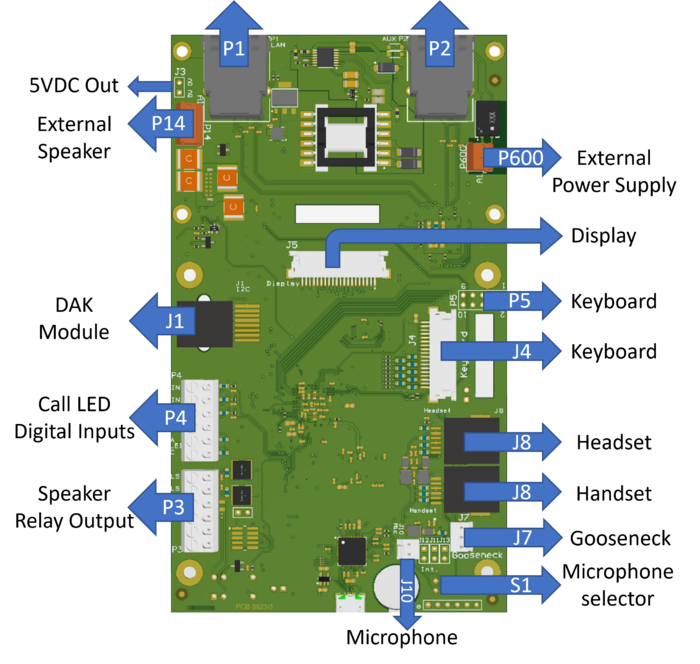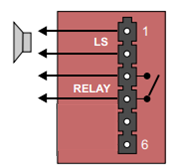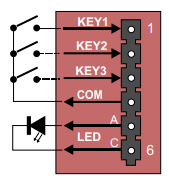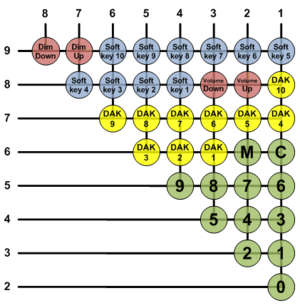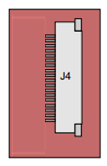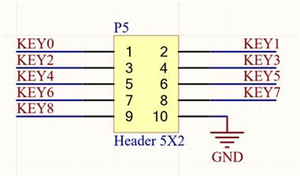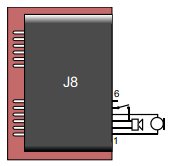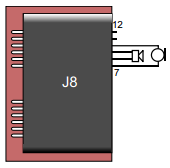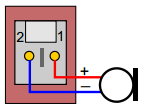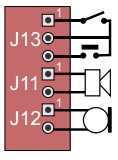IP Flush Master -V2 Board Connectors
From Zenitel Wiki
This chapter gives details about connections and indications for:
P1 LAN port & P2 AUX port
P1:
LAN connector for 10/100 Mbit Ethernet connection. The station can be powered from this connection if the line supports Power over Ethernet (PoE).
The connector has two LEDs in front where the right (R) LED indicates Ethernet speed and the left (L) LED verifies Ethernet link and traffic. (L and R as seen from the connector side)
P2:
RJ45 connector for auxiliary equipment like IP camera, PC or a second IP station. This port does not have an individual IP address. It does not carry power for AUX equipment.
P3 - Internal Loudspeaker, Relay Output and External Power Input
6-pin plug-on screw terminal for external connections.
- Pin 1/2 Connect to the internal loudspeaker.
- Typical impedance: 8 Ω
- Recommended impedance: 6-25 Ω.
- Pin 3/4 Internal NO relay contact for door lock control etc.
- Pin 5/6 Not in use.
P4 - Inputs and Station LED
6-pin plug-on screw terminal for external connections.
- Pin 1/4 Input 1
- Pin 2/4 Input 2
- Pin 3/4 Input 3
- Pin 5/6 Station LED for call message info.

|
|
J4/P5 - Keyboard and DAK LED
Keyboard matrix is available on connector J4. Pin 1-9 is used.
In software you can choose between four different matrix types, see Keyboard Settings.
J4 - Keyboard matrix
18-pin ZIF-connector for keyboard. The keyboard may have up to 10 dialling keys, M and C keys, 10 DAK keys, 10 soft keys, volume up/down and light dim up/down keys connected in a matrix according to the drawing.
P5 - Keyboard
J4 - DAK LED connection
Optional DAK LED connection.
- J4/10 DAK1 Green LED
- J4/11 DAK1 Red LED
- J4/12 DAK2 Green LED
- J4/13 DAK2 Red LED
- J4/14 DAK3 Green LED
- J4/15 DAK3 Red LED
- J4/16 DAK4 Green LED
- J4/17 DAK4 Red LED
- J4/18 Common +3.3 V
The DAK keys and the DAK LEDs are programmed using IND commands in the Event Handler. DAKs 1 to 4 and Soft keys 1 to 4 are used in current master stations.
Privacy on/off is accomplished by pressing the C key for 3 seconds. A circled P is shown in the display during Privacy mode.
=J5 - Display
20-pin ZIF connector for LCD display. Separate display panels are available as a kit of 5 units (order no. 1008099000).
J1 - DAK48 Module
RJ45 Connector for I2C interface. Used for connection of DAK modules.
- Pin 1 GND
- Pin 2 A0 (GND)
- Pin 3 A1 (GND)
- Pin 4 NC (GND)
- Pin 5 IRQ
- Pin 6 SCL (Clock)
- Pin 7 SDA (Data)
- Pin 8 +13 V
J7 - Gooseneck Microphone
3-pin header for connecting gooseneck microphone.
- Pin 1 MIC+
- Pin 2 MIC-
- Pin 3 GND
J8 - Handset and Headset
Dual RJ11 for handset and headset. Handset can optionally be connected via J11, J12 and J13.
Handset:
- Pin 1 Mic+
- Pin 2 Spk+
- Pin 3 Spk- (0 V)
- Pin 4 Mic-
- Pin 5 Hook-switch (must be connected to pin 6 via a switch)
- Pin 6 Hook-switch Ground
Headset:
- Pin 7 Mic+
- Pin 8 Spk+
- Pin 9 Spk-
- Pin 10 Mic-
- Pin 11 PTT Ground
- Pin 12 PTT (Not currently supported by SW)
P14 - External loudspeaker
3-pin screw connector for connecting external 8 ohm loudspeaker, max 5W. Operates in parallel with built-in speaker.
- Pin 2/3: 8 Ohm loudspeaker
J10 - Microphone
Internal microphone
- Pin 1 MIC+
- Pin 2 MIC-
J11, J12 & J13 - Handset
Pin header for handset connection. Same as J8 pin 1 - 6.
- J11 Pin 1 Spk+
- J11 Pin 2 Spk-
- J12 Pin 1 Mic+
- J12 Pin 2 Mic-
- J13 Pin 1 OFFHOOK
- J13 Pin 2 GND
- J13 Pin 3 PTT (Not currently supported by SW)
S1 - Microphone Selection
Slide-switch to select internal microphone (Int) or gooseneck microphone (Ext).


